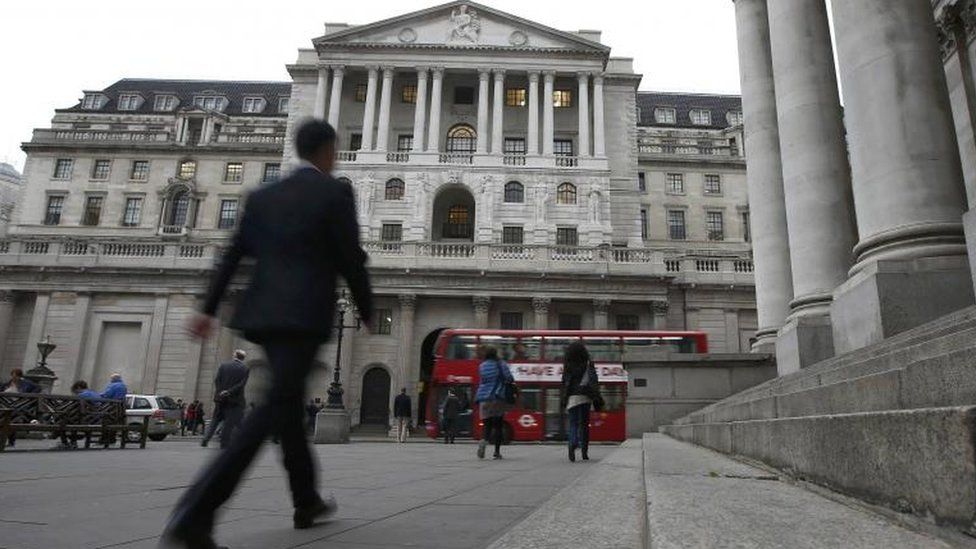Bank of England sharply raises 2017 growth outlook
- Published
- comments

The Bank of England has made another dramatic rise in its growth forecast for this year.
It expects the economy to grow 2% in 2017, up from a November forecast of 1.4%, which was itself an upgrade from the 0.8% forecast made in August.
The Bank also made a striking forecast about the savings rate, which it expects to fall to 4%, the lowest rate since the early 1960s.
As expected the Bank kept interest rates on hold at 0.25%.
The raised growth forecast follows much criticism levelled at the Bank for being too gloomy when it drastically cut its growth forecast after June's vote in favour of Brexit.
"Domestic demand has been stronger than expected in the past few months, and there have been relatively few signs of the slowdown in consumer spending that the committee had anticipated following the referendum," the Bank said in its latest Quarterly Inflation Report.
The Bank said the latest, improved forecast was partly the result of higher spending and investment contained in Chancellor Philip Hammond's Autumn Statement.
It also credited stronger growth in the US and Europe, rising stock markets and the greater availability of credit for households, for its more optimistic outlook for the UK economy.
However, the Bank still sees the economy slowing in 2018, when it expects growth of 1.6%.
It blames that deceleration on an expected slowdown in spending by households as they adjust to higher inflation. The Bank thinks that income growth, when adjusted for inflation, will stall in 2017.
It predicts "a significant fall in the saving ratio over the next three years as consumers take time to adjust spending growth to weaker income flows". The savings rate is expected to fall to 4%, the lowest rate since records began in the early 1960s.
The erosion in consumer spending power is partly down to higher consumer price inflation, which the Bank forecasts running at 2% this year, slightly higher than its previous forecast of 1.8% made in November.
Much of that inflation is the result of the weaker pound, which is making imported goods more expensive.
Pound impact
The pound is still about 16% below the level seen before the referendum. In recent months it has fallen below $1.21 against the dollar, but has bounced off those lows.
The Bank expects the weakness in the pound to propel inflation higher and it expects inflation of 2.7% next year, which is well above its target rate of 2%.
Bank of England governor Mark Carney has said the Bank is prepared to tolerate inflation running above its target, but in the minutes from their latest meeting, members of the Monetary Policy Committee said they had moved "a little closer" to the limit of that toleration.
Sterling fell sharply after the release of the Bank's inflation report. The pound dropped nearly a cent against the US dollar to below $1.26 as the markets interpreted the report as indicating that the Bank was in no rush to raise interest rates.
Weak wages
The Bank has also been surprised by the modest rises in wage growth.
"Pay growth, although edging up, has remained persistently subdued by historical standards - strikingly so in light of the decline in the rate of unemployment to below 5%," the Bank said in its report.
Economic theory says that wages should be driven up when unemployment is low, but the Bank now thinks there is more slack in the economy than it previously thought and estimates the economy can run with unemployment at 4.5%, without sparking wage inflation.
The Bank says it will be closely watching spending growth, if it slows more abruptly than expected "there is scope for monetary policy to be loosened".
However, it warns that if pay growth picks up more than anticipated interest rates may have to be raised more sharply "than the gently rising path" implied by the financial markets.
The financial markets are forecasting a 50% chance of a rise in interest rates this year and see a rise as almost certain before the end of 2018.
During a press conference after publication of the report, Mr Carney said that Brexit issues would continue to hang over the economy.
"The Brexit journey is really just beginning. While the direction of travel is clear, there will be twists and turns along the way," he said.
"Consumers have not been affected by the uncertainty around Brexit."
However, he added that although the Bank had raised its growth forecast, this "doesn't mean the referendum is without consequence".
"Uncertainty over future arrangements is weighing on business investment, which has been flat since the end of 2015," he told reporters.
Mr Carney did, however, acknowledge that the Bank misjudged consumer confidence immediately after June's referendum.
"The thing that we missed is the strength of consumer spending and consumer confidence associated with that," he said. "After an initial wobble in terms of consumer surveys... it bounced back pretty quickly."
- Published2 February 2017
- Published31 January 2017
- Published26 January 2017